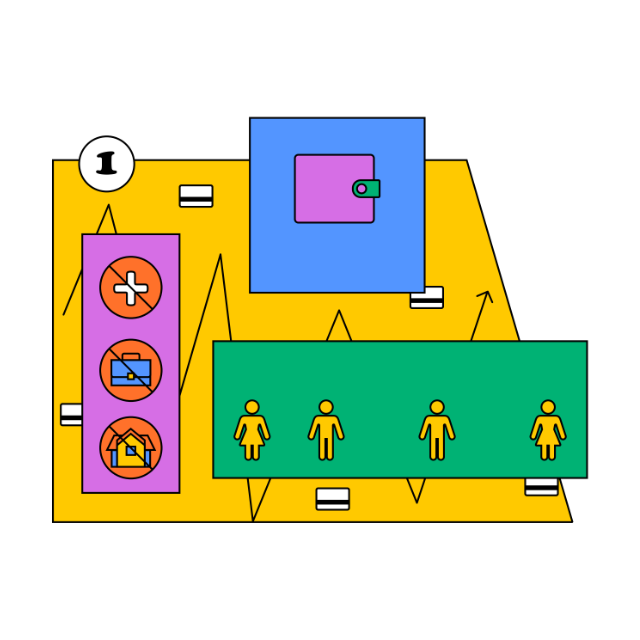SDG 1No poverty
How to prevent social exclusion? Is it possible to ensure that everyone is protected from unemployment and has access to basic social services?
Overview
According to UN sources, everyone who has less than $1.25 per day lives in extreme poverty. There are currently about 850 million inhabitants of our planet affected by such deep poverty, mostly in Southern Asia and sub-Saharan Africa. Generally, these are small, unstable countries, permanently afflicted by social and political conflicts.
The concept of poverty, however, is much broader. European poverty cannot be compared to the existential situation in the world’s poorest countries. Nevertheless, it can be defined even there: a “poor” person in the EU is someone whose monthly income is less than 60% of the median wage in their respective country. These people feel excluded from ordinary life, too.
Poor people have limited access to education and are more at risk of falling into economic or social exclusion, from which it is very difficult to find a way out. In extreme cases, they may drop out of the formal labour system altogether, which, in addition to personal bankruptcies, results in the state losing a significant amount of money.
If poverty is not tackled, we risk widening the gap between the rich and the poor, which causes conflict in society and, in extreme cases, to all the dangerous consequences of political extremism.
Solution and Key Innovations
The UN’s current goal in this area is to eliminate poverty worldwide by 2030. Furthermore, the aim is to ensure that everyone is protected from unemployment and has access to social services such as healthcare, education, unemployment assistance, sick leave, and old age and disability support pensions at a level that ensures a dignified life.
There are a number of institutions that aim to tackle extreme poverty, social exclusion, lack of access to education, healthcare and unemployment support, such as The European Anti-Poverty Network (EAPN), which includes 31 national voluntary organisations and citizen groups of 13 European organisations. The members are involved in numerous activities aimed at tackling poverty and social exclusion, including educational and training activities, provide services that promote the empowerment of people suffering from poverty and social exclusion. One of the EAPN projects targets a highly topical issue – fuel poverty. The project aims to gain in-depth knowledge about consumer vulnerability and fuel poverty in particular, as there is still no clear definition and no way to measure it.
The issue of poverty is prominent in science, too. It is being researched even at the most prestigious universities and researchers are looking for ways to not only stop poverty but are also concerned with its impact – that is the way to show politicians and officials that poverty is affecting even those who are not poor at first sight.
The Oxford Poverty & Human Development Initiative at Oxford University is an economic research centre which aims to develop a more systematic methodological and economic framework for the reduction of poverty.
The minimum wage is a key issue. The level of the minimum wage varies from country to country and settling it is often a question of wild discussion. It is a crucial signal for the job market and employees alike who can be sure that their income will cover their basic needs. Another concept is the minimum decent wage which is intended to ensure a bit more: a decent life. According to the Minimum Decent Wage platform, in the Czech Republic it is 31,146 CZK per month.
Europe can help reduce social exclusion in society through social housing, which temporarily helps clients in difficult situations to avoid the risk of losing a place to live. Housing affordability is a major issue in Europe (and beyond), which is growing even more serious in the context of rapidly rising interest rates and inflation. Social housing systems have long been operating in a number of Western European countries such as Denmark, France, Luxembourg, and Sweden.
Key Words
Poverty, primary poverty, energy poverty, decent minimum wage, social housing
Key Questions
- Is eradicating extreme poverty by 2030 realistic?
- Can European countires prevent poverty on the richest continent?
- Can we show people their own “way out”?
- Do we all understand that ending poverty is good for all of us, including those seemingly unaffected by it?
